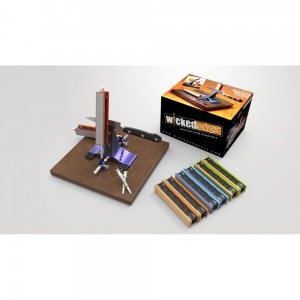Knife Care, Maintenance & Safety
Posted by admin on Oct 12th 2015

With a little routine upkeep, a quality knife can provide decades of dependable service. First, let’s get some common sense points out of the way. To begin with, never use your knife for tasks other than its primary purpose: cutting. While different blade styles allow for all manner of piercing, slicing and sawing, it is generally best to confine the use of your knife to its intended purpose. This means refraining from gouging, prying, hammering or any other potentially abusive action that will, at the very least, shorten the longevity of your knife’s lifespan. Next, bear in mind that your knife is first and foremost a tool. Treating it with respect and care will ensure personal safety and continued performance over time. Always cut away from yourself and be sure to make precise and deliberate cuts. Keeping your knife clean, oiled and sharp will go a long way towards protecting your investment in a quality tool that has both practical everyday uses and possible lifesaving potential.
Moisture, fingerprints and debris are your enemy when it comes to keeping your knife in top form. Always pick a cool dry place for storage, wipe away fingerprints and moisture, and clean the pivot point (or other nooks and crannies) with a Q-Tip or air duster. A drop or two of decent oil to the blade will help prevent rust and corrosion, while oil, used sparingly, around the pivot area will help ensure good action and ease of movement. For knives that may be used for food purposes, mineral oil is a safe bet. Though it may evaporate relatively quickly, it is cheap, plentiful and will not impart any toxins or go rancid over time. If your knife should see use in a saltwater environment, be sure to rinse it thoroughly after use, allow it to dry completely and consider applying wiping it down with a light coat of oil to protect the steel.
As the old adage goes, a sharp knife is a safer knife. Though perhaps seemingly counterintuitive at first, experience shows us that a sharper knife allows for more exact cutting using less force and diminishes the opportunity for slippage. A sharper knife improves cutting technique by reducing the exertion required to perform the task. A sharp knife, used responsibly with fingers away from the business end and out of harm’s way, is actually a very safe tool.
As a simple reminder for knife care, remember DOCS:
Dry- The entire knife along with the blade
Oiled- Moving parts in particular
Clean- All pivot points and locking mechanisms
Sharp- To ensure effective and safe cutting
Should your knife require some service beyond general maintenance, virtually all reputable knife makers offer some kind of warranty or servicing policy. Since these guidelines vary from brand to brand, it is best to check directly with the manufacturer for the most accurate information. Unless very confident in your abilities, it is wise to allow any repairs, modifications or other service to be performed by a professional. Working on your own knife may void the warranty, as will any other actions considered misuse or abuse, including using the knife as a hammer, chisel, pry bar and screwdriver. Normal wear and tear is also not typically warrantied. Much like any other tool, if properly maintained and used within the parameters of its intended purpose, malfunctions are rare and a person can reasonably expect to rugged dependability. If a new knife owner follows these guidelines and exercises caution and common sense, they will not only protect their investment but also have a trustworthy tool suitable for years and years of faithful service.

